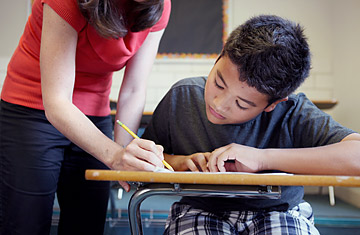
Share On Social!
Kindergarten is a crucial time for all young students. It is the time when the foundations of fundamental learning skills are laid and can greatly impact the rest of a student’s academic career. Kindergarten is especially crucial for children when it comes to language learning.
For Latinos and other low-income kids, they face the additional challenge of having obstacles in place at school and at home.
“Children may go from a home with limited physical and psychological resources for learning and language to a school with similar constraints, resulting in a double dose of disadvantage,” said Susan Neuman professor of childhood and literacy education at New York University in an interview with Medine Plus.
Neuman and her colleges followed 70 kindergarteners in Michigan (4.72% Latino population) and gauged their readiness skills, such as vocabulary knowledge and letter and word identification. Half of the students lived in economically poor areas of Detroit (7.68%), while other were from more diverse, working-class neighborhoods.
In order to reduce health disparities, it is critical to address inequities in programs, practices, and policies. Join our site, connect with others, and get involved.
The researchers found that, while the quality of language that the children were exposed to differed, the quantity did not.
At the children’s homes, researchers found that parents in the poorer areas spoke in shorter sentences, used fewer words, and had lower reading comprehension than parents in the working-class areas.
In the schools, the same disparity was found. Teachers of kids from poorer neighborhoods tended to oversimplify their language and used simpler sentences with few unique words.
While all the children made progress in language learning, those from the working-class areas made greater advances.
“Our study suggests that neighborhoods matter and can have a powerful influence on nurturing success or failure,” said Neuman, who was also lead author of the study which was published in the Journal of Educational Psychology. “Tragically, the children who need the greater opportunity to learn appear to be the least likely to get it.”
To help children overcome early disadvantages, both parents and teachers need to be involved in building language skills, the researchers said.
The full study can be read here.
Read stories similar to this one:
- Mass. will pay for AP STEM tests for low-income students. #SaludAmerica #Education http://salud.to/2nBRzQ7
- A study from @ChildTrends says #Latino kids start school 3 mos. behind in math! #SaludAmerica #Education http://salud.to/2ooKfry
Explore More:
Healthy Families & SchoolsBy The Numbers
142
Percent
Expected rise in Latino cancer cases in coming years



